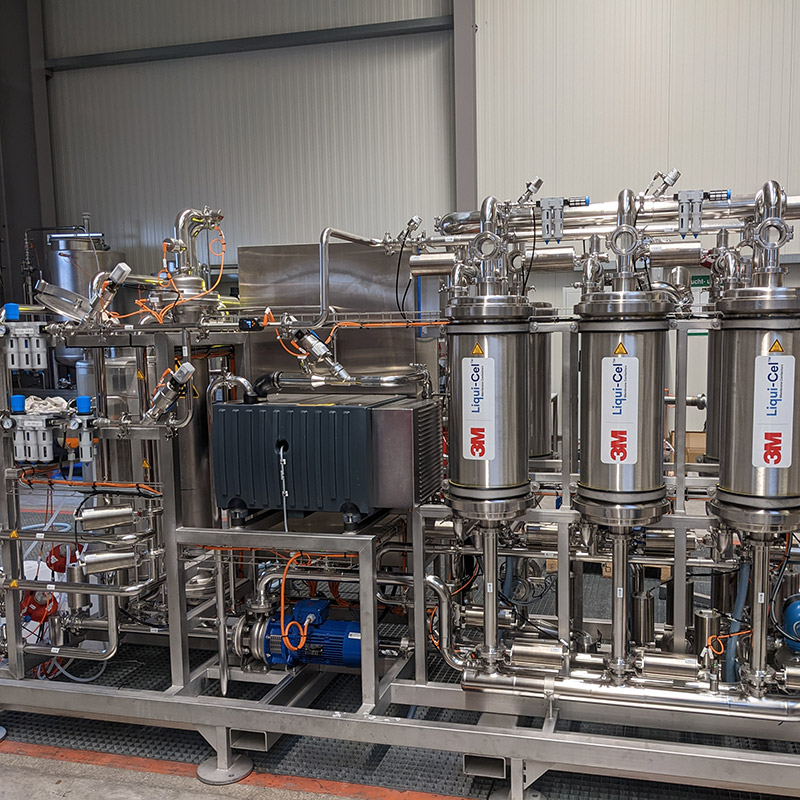"I have a vineyard with a potential production of 40 hl/ha. To achieve ripe tannins, I have to wait until I lose so much volume through evaporation that the yield drops to 34 hl/ha. Why shouldn't I be allowed to bring some of what I lose through evaporation back into the cellar?" asked the prominent - and no controversy shying - Rhône winemaker Michel Chapoutier in April 2021 "The problem is: the sugar content, that is, the physiological ripeness, increases very quickly. But that doesn't mean that phenolic ripeness is progressing." His proposal therefore aims to restore the balance between the two ripening components in the cellar. Chapoutier asks, "How much higher should the alcohol content go in the face of climate change?"
"That will never be allowed in the EU," Monika Christmann, professor of oenology at Geisenheim University, explains. As Honorary President of the International Organisation of Vine and Wine (OIV), she is the rapporteur of the working group "Water in Oenology". She clarifies: "In the EU, water is not allowed in winemaking. Clause 1 of the European and thus also German wine law applies: "Wine is made from grapes, crushed grapes or grape must. Full stop."
_pixabay(1).jpg) If water is added to wine, it must be called mixed wine drink in the EU
If water is added to wine, it must be called mixed wine drink in the EUIn the USA and Australia, for example, it is different: "The addition of water is generally permitted for technological reasons and in particular for the incorporation of oenological substances authorised as food additives or processing aids. The various regulations do not specify a maximum percentage of water used for technological purposes", the current OIV report states.
But what are "technological reasons"? "This is to achieve better fermentation," Christmann explains. "With very high sugar concentrations in the must, there is also a high osmotic pressure. This draws water out of the yeast cells into the must, and that impedes proper fermentation. By adding water, the osmotic pressure is reduced and fermentation is more stable. But even overseas they don't say: we add water. They coyly speak of 'Jesus units'," Christmann explains the differences. The "Jesus units" are an allusion to the biblical passage of the Wedding of Cana, where Jesus turned water into wine. Sometimes the addition of water is also called "Black Snake Fining". The "black snake" simply refers to the water hose.
Together with permitted treatment agents, however, water is allowed in the wine. "We recently investigated how much is added in this way," reports Christmann, "and were shocked! In extreme cases, four percent water was added to the wine." This does not only happen with discount wines, but also with highly rated and expensive premium wines.
 Osmotic distillation plant for the removal of alcohol
Osmotic distillation plant for the removal of alcoholDoes the ban on adding water put the European wine industry at a competitive disadvantage? "Absolutely," answers the oenology expert. "For more than 20 years, there has been a bilateral agreement between the EU and the USA that allows all the processes permitted in the USA to be used and the wines to be sold here - even if they are not permitted in Europe during production." The rationale for this, he says, is simply put: "If it won't hurt an American, it won't hurt a European." This means: wine from the USA to which water has been added is considered marketable in Europe because it is permitted in the USA. This means that producers in the EU do not even have to declare it. The agreement with the USA is also applied to Australian wines. Christmann sees above all a cultural difference: "In Europe, people rely on numbers and limits. If they are adhered to, everything is fine. In the New World, on the other hand, they rely more on 'Good Manufacturing Practices' (GMP) - and they are very vaguely formulated, you can hide a lot in them." With the agreement, the EU was very generous to the Americans: "At that time, it was not assumed that high alcohol contents could become so important in 20 years. At that time, must concentration was the big issue, i.e. enriching must by dehydration. That has turned into the opposite."
Monika Christmann suspects that customers are more likely to accept it if something is filtered out of the wine using physical methods - such as membranes or vacuum evaporation - than if something is added to it. She says that a few years ago at ProWein there was a tasting on this subject. The audience was asked whether they would drink a wine whose must had been concentrated. The vast majority said no. Then they were asked who would drink this wine if the must had been enriched with sugar - the rejection was even greater. "It's a question of perspective," she explains. Because you cannot prove the procedure sensory. "If a winemaker declares that he has filtered out something undesirable, it is more likely to be accepted than if he says he has added something." She draws a clear conclusion from this: "The wine industry has made the mistake of calling wine a natural product for too long. This is now falling on our feet. There has never been wine in bottles grown on trees. Wine is a cultural product."
This could result in two possibilities in times of climate change: Either customers would get used to new grape varieties and wine styles, or they would accept technological processes to preserve the styles they are used to. "With the new mandatory labelling of wines, we have to declare additives such as acidity, but not the use of membrane filters or vacuum distillation. There will be some shifts in perception," Monika Christmann says and sums up: "One always had to react to the respective challenges with the possibilities of one's time. Both are different today than they were 100 years ago."
Cover photo: ©Pixabay